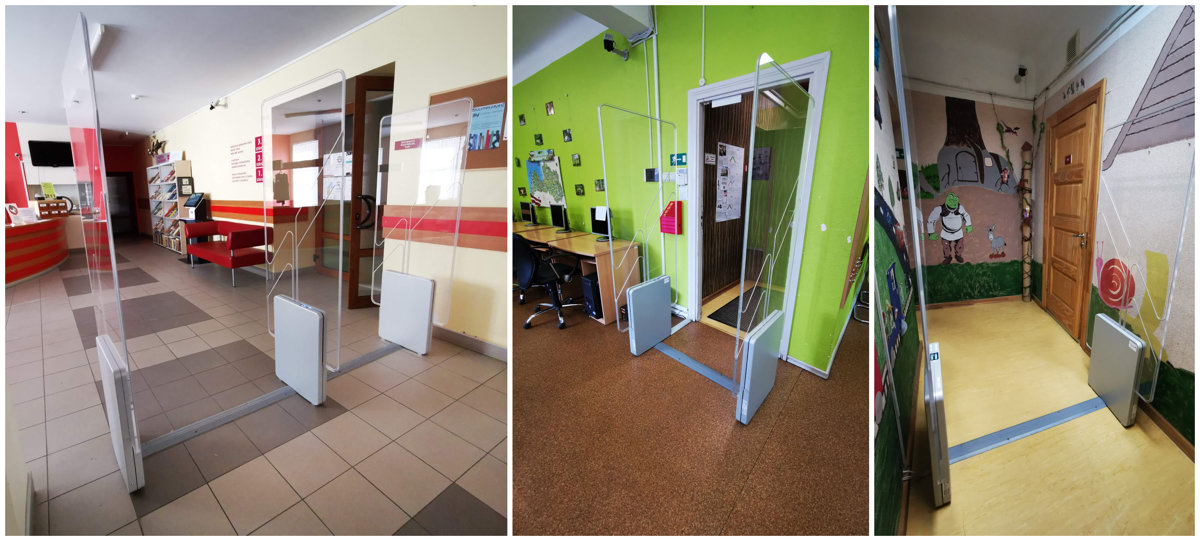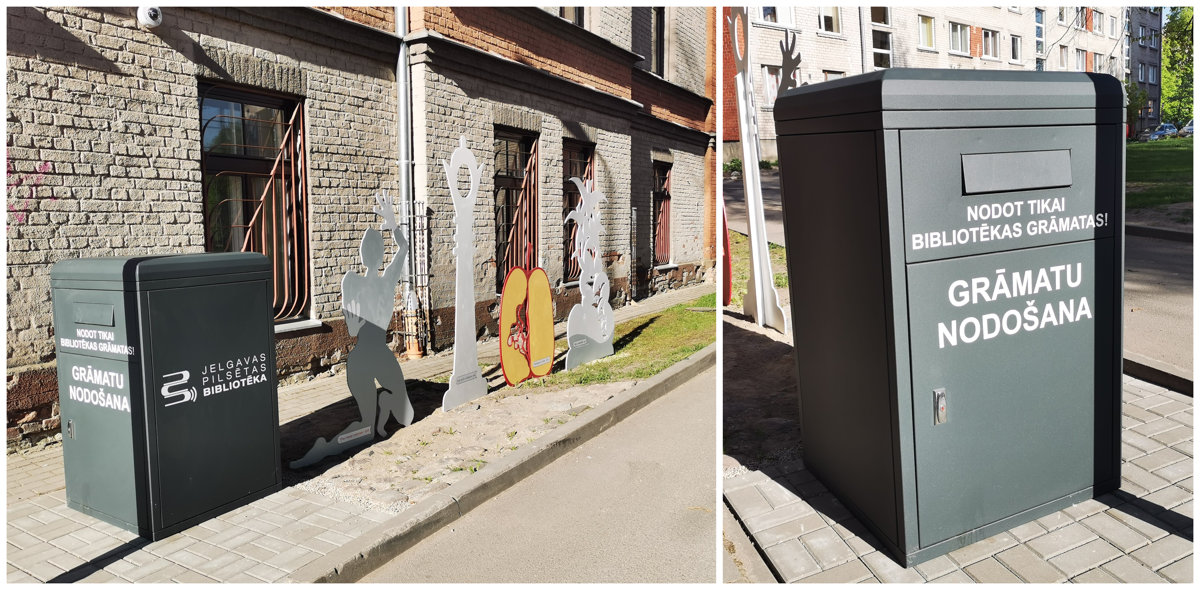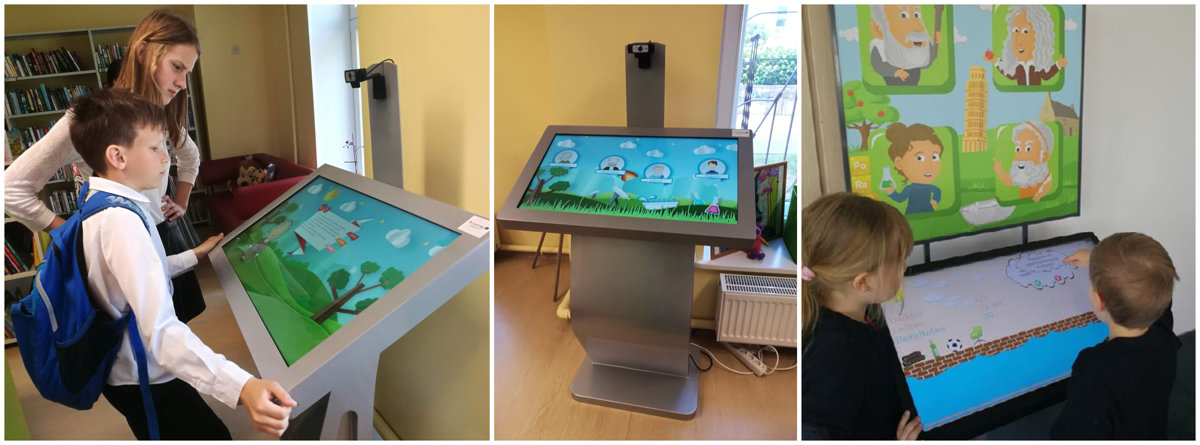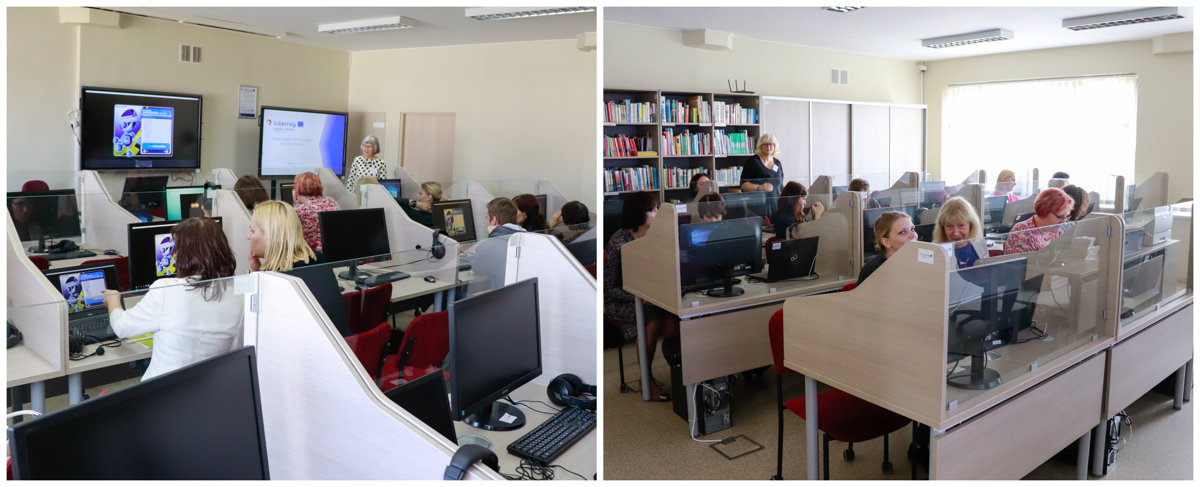Project results
SELF-SERVICE SOLUTIONS AND NEW SERVICES INTRODUCED DURING THE PROJECT
There are four main groups of services introduced during the project (see picture below)
Figure 1, Groups of services developed and implemented during the
project, source: created by Ideju un Inovāciju institūts
Libraries are
now more than ever, increasingly depending on technologies to continue on their
efforts to provide better and effective services at minimum cost to their
users. That is the main reason why Jelgava City Library and Liepaja Central
Scientific Library has upgraded their library services through the Interreg
project and introducing library self-service system, but Siauliai City
Municipality Public Library has upgraded their library services through
independent language learning system at the library.
RFID TECHNOLOGIES (radio frequency identification technology) – service has been
introduced in Jelgava and Liepaja.
RFID security gates - The main function
of the security gate is to trigger an alarm when any library is taken out
through these gates without checking out on Library Management Software. This
is function is not limited to only triggering an alarm, but it can be extended
to the following:
- It identifies which item has been taken out of through the security rules. It will show either the accession number of the item or the title of the item which is taken out without checkout. This identification can be monitored on any designated computer in the library.
- It can be connected to Magnetic door lock, so that moment the item is taken out through the security gate without checkout, it will also lock the door.
- It can be connected to the Camera, so it will also take the photo of the person taking out the item without authorization.
- It's allows to keep the count of the people entering and leaving the gate.
Security gates
protect the most important property – the books. Upon implementation of
self-service systems, the library staff participate less and less in the
process of issuing and returning books, thus it is less controlled. Security
gates prevent accidental, as well as intentional theft of publications, thus
librarians are not supposed to guard the recourses of the libraries. Special
markers/stickers are attached to publications, which are detected by the
security gates. If someone attempts to pass the security gates with a
publication that was not registered as issued in the system, the gates alarm
the staff. Service has been introduced in Jelgava and Liepāja. Following the
positive experience of partnering libraries, library of Siauliai is also
introducing such gates in another development project.
 Photo: RFID gates in Jelgava City Library and branch library “Zinītis”
Photo: RFID gates in Jelgava City Library and branch library “Zinītis”
RFID selfcheck - It conveniently allows
users to issue and receive books and other items (such as films, games and
CDs), extend reading deadlines on their library account for themselves without
librarian participation. Selfcheck allows librarians to continually evolve new
service to the community and focus on more meaningful interactions.
 Photo: SelfCheck in Jelgava City Library and branch library “Zinītis”
Photo: SelfCheck in Jelgava City Library and branch library “Zinītis”
RFID workstation – the RFID workstation
is intendent for use by library staff to check-in and checkout library
materials. Designed for use with a customer-supplied library materials, barcode
scanner and memory card drive.
RFID book tag - an RFID tag typically
comprises a micro-chip and an antenna. The whole device (including the chip) is
packed as a paper-thin adhesive label which may come in a variety of shapes and
sizes appropriate to the labelling of books, videos, DVDs and CDs. This RFID
tag can be applied to library resources in various ways to improve both stock
management and security.
Digital Library Assistant - device
allows library staff to quickly and easily conduct item inventory tasks, such
as checking the shelf order, identifying misitems and finding specific items
within the library stock.
Bookdrop (book return box) - it allows books to be returned at any time, even outside normal library opening hour. Improving customer service and allowing library staff to get on with other tasks within the library. This box is standing outside the building and is accessible 24/7. Such box makes library more available as clients can return books any time it is convenient for them. Additional benefit for users is that they can spend less time, as there is no need to stand in a queue. Such box also improves the efficiency of librarians, as they can sort brought books in times when there are no clients at the desk, so the workload becomes smoother. Service has been introduced in Jelgava.

Photo: Bookdrop in Jelgava City Library
AN INTERACTIVE GAME IN SCIENCE - the
interactive game is foreseen as a self-learning tool. It is software with
different tasks for life sciences and mathematics. The game is integrated in an
interesting and appealing interactive multimedia stand with touch screen, web camera
and software in multiple languages (Latvian, English and Russian) which
incorporates four interactive games:
- Galileo Galilei – the main purpose of the game is to answer the question “how do objects fall?”
- Isaac Newton – the main purpose of the game is to visually present the 3 Newton laws.
- Archimedes – the main purpose of the game is to present Archimedes principle
- Maria Curie – the main purpose of the game is to tell and present what X-ray devices are and how do they operate.
Interactive
game has been introduced in Jelgava and Siauliai.
 Photo: Interactive game in Jelgava City Library and Siauliai City Municipality Public Library
Photo: Interactive game in Jelgava City Library and Siauliai City Municipality Public Library
INTERACTIVE TABLE for use of various
games and software. The library uses this interactive desk to create its own
educational games, such as “Get to know your library”. In this way, children
learn about library services in an interesting and appealing way. Interactive
table has been introduced in Jelgava.
 Photo: Interactive table in Jelgava City Library branch library “Zinītis”
Photo: Interactive table in Jelgava City Library branch library “Zinītis”
PROJECT PARTNERS HAVE INTRODUCED NEW
APPROACHES WITHIN THE PROJECT:
“Families
interact and learn”. As part of this approach, JCL children of different ages
and their parents may participate in various educational activities.
THE FAMILY SPACE is an interactive and
physical environment, dedicated for families to spend time together and learn.
This space is used for introduction of the new method “Families interact and learn”.
Families learn and improve various skills – creativity, logical, strategical
and model thinking, communication skills, improve relationships with other
members of the family etc. This is a new service for the library and by
offering different additional services libraries attract new visitors that my
turn into new users. These kind of "Family Spaces" are common in
libraries of Finland, which was observed during the experience exchange trip of
librarians to this country. Service
introduced in Siaulai, and to lesser extent also in Jelgava and Liepāja, as
these libraries also bought board games and developed interactive game, which
can be played/used together with families.
INFORMATIVE EDUCATIONAL WORKSHOPS FOR
FAMILIES “THE OWLET SCHOOL”, that is a training for 3 years old kids and
their parents. The Owlet school - is a motivator that promotes interest about
books and reading, self-learning, making new friends, tuying free time,
creating a favorable environment to encourage children to become and competent
people. It should be emphasised that visitors of the younger generation are
both future readers of the society and the future of urban culture, education
and science. Every year JCL and its branch libraries offer for everyone
three-year-old child and his parents to attend these events for free.
INFORMATIVE EDUCATIONAL WORKSHOPS FOR
FAMILIES “GET TO KNOW YOUR LIBRARY” that are aimed at making children and
their parents interested in visiting the library, to enhance reading pleasure,
to discover the library and its services, to work together and explore new
things.
LOCAL COMPETITIONS OF FAMILIES “BIBLIOMANi” AND CROSS BORDER COMPETITIONS OF FAMILIES “KNOW OR GUESS” where 25 families participated in JCL Family Competition. Teams demonstrated their erudition, knowledge, skills and also success in solving 11 tasks. Theese teams tried to built a book tower, to find the books they needed on the library shelves, organised books in alphabetical order, performed foreign language tasks, etc. Purpose and tasks of local family competitions:
- promoting the library as a place for families where it is interesting to spend their spare time and learn new knowledge in science and foreign languages.
- to find out the cities of Jelgava and lead the most erudite and active families.
- Nominating the 5 most effective families to participate in the finale of the Family Competition in the Public Library of the Municipality of Shaul (Lithuania).
- implement the principle: the key is not to win, but to enjoy moments of co-operation.
- to consolidate and create a friendly environment for Jelgava city and county families.
THE INTRODUCTION OF THE “LEARNING FROM EACH
OTHER” approach attracted young volunteers (e.g. pupils from schools) and a
Lithuanian student who has also acted as a volunteer in the public library of
the municipality of Shauļu.
This is a method
which encourages productive collaboration between different generations that
visit the library. More promising and active youths are involved in library
services through the international “knowledge ambassadors” network. The benefit
of this activity is that library services accessibility is improved and senior
community become more advanced in technologies. This way the initiative
contributes to the improvement of quality of life amongst general population
and particularly the elders and contributes toward the increased use of
libraries. All of the libraries have the potential for implementing this method
in long term, because it does not require great additional financial resources
and encourages efficient use of existing library resources of all generations.
Volunteer youth
led individual lessons for seniors as a way to operate a self-service facility.
It should be acknowledged that recruitment of young volunteers was one of the
most difficult tasks of the project. This task requires a large amount of time,
work resources and initiative from young people themselves. However, the
project has encouraged more active work on such tasks and to pursue this
approach beyond the end of the project.
INDEPENDENT LANGUAGE LEARNING SYSTEM AT THE
LIBRARY - by offering different additional services libraries attract new
visitors that my turn into new users. Learning languages becomes more and more
important in now days. Library uses
software “EuroTalk Interactive” which allows independent study of English,
German, French, Italian, Spanish, Russian and Latvian languages. Software has a
good versatility and adaptability to all generations of visitors – each user
can choose the level of the language being learned, depending on their
competences and needs. Most languages can be learned in 6 different levels,
except for Russian – 5 levels, Latvian – 4 levels. Service has been introduced
in Siauliai.
 Photo: language learning system at the Siauliai library.
Photo: language learning system at the Siauliai library.
The main benefits of the system:
- The knowledge of foreign languages allows the visitors to use a wider range of digitized library and other organisations’ services independently (e.g. international books, magazines or databases of publications);
- Employment opportunities are improved - potential employers consider language knowledge as a valuable asset in an employee’s skill set, as in now days businesses have less and less borders. The competitiveness of the region is increased while rising the educational standard of local residents;
- Quality of life is improved – knowledge of languages gives more opportunities for communication and collaboration, travel, self-expression and occupational opportunities.
- English language understanding will help customers of libraries better learn and use computer, mobile devices and other modern technologies.
- As a system is "do it yourself" librarians can be assigned to other tasks, they do not have to spend much time on serving the users. In this way library runs additional service, attracts new visitors, without using extensive staff resources.